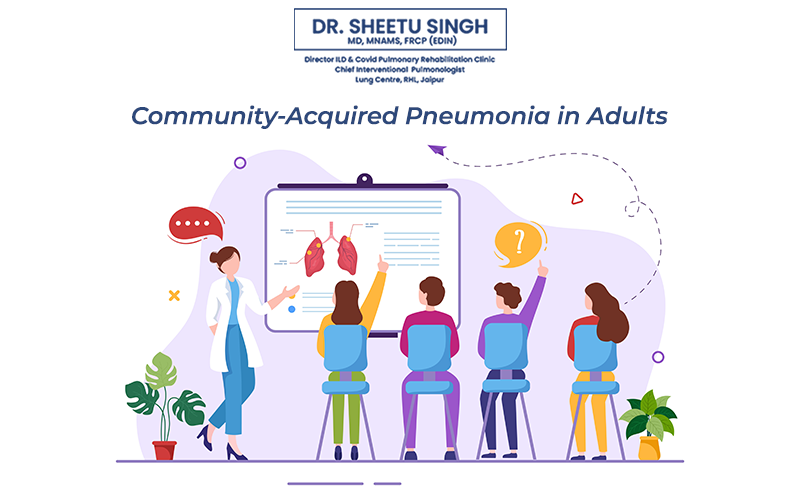
Community-Acquired Pneumonia in Adults: Lung abscess and, in rare cases, empyema are potential CAP side effects. In Empyema, a collection of pluses builds in the space between the chest wall and the lung. You usually need drainage and antibiotics to treat it. A CT scan can often help to diagnose these problems.
Death and respiratory failure are other possible complications. This occurs more frequently in older adults or people who have significant health issues.
What is Community-Acquired Pneumonia?
Pneumonia is a type of lung infection. It can result in symptoms including difficulty breathing. Community-acquired Pneumonia (CAP) is an infection that occurs in a group of people. It doesn’t happen in nursing homes, hospitals or other healthcare centers. A component of your respiratory system is your lungs. This system eliminates waste carbon dioxide while supplying your blood with new oxygen. When you breathe in air through your mouth and nose, it reaches the tiny air sacs of the lung through a series of tubes, your blood receives oxygen from here. Carbon dioxide flows out from the blood into the alveoli and you then breathe it out.
Numerous germs can develop inside your body and lead to illness. Invading germs of a certain sort can result in Pneumonia and lung infection. This could result in poor respiratory system function. For instance, oxygen may not be able to enter your bloodstream as quickly. That can cause shortness of breath. Pneumonia may cause death if your body is unable to obtain enough oxygen to survive.
Sometimes these germs can transmitted from person to person. You may breathe the germs into your lungs when a person with one of these infections sneezes or coughs. If your immune system doesn’t first eradicate the pathogens, they may develop and result in Pneumonia.
CAP can develop as a result of infection with several bacteria. These include viruses, bacteria, parasites and fungi. Pneumonia symptoms can range from minor to severe. In adults, CAP is more common during the winter months. However, it can have an impact on people of all ages.
What Causes Community-Acquired Pneumonia?
A vast variety of germs can cause pneumonia. But some do CAP more frequently than others. Worldwide, the bacteria streptococcus pneumoniae is typically to blame for CAP in adults. A few additional typical microorganisms that cause CAP include:
- Mycoplasma Pneumonia.
- Hemophilus Influenza.
- Legionella.
- Chlamydia Pneumonia.
- Staphylococcus Aureus.
- Gram-negative Bacilli.
The primary viral cause of CAP is the flu (Influenza) virus. Additionally, bacterial pneumonia is more likely to develop if you have the flu. This type is often worse than viral Pneumonia. Other types of viruses can also cause CAP, such as Echovirus, Parainfluenza virus, Coxsackievirus and Adenovirus. The majority of CAP episodes are probably brought on by viruses. Parasites and Fungi may also cause CAP.
What are the Symptoms of Community-Acquired Pneumonia?
CAP symptoms frequently appear suddenly. These symptoms may include:
- Coughing
- Heavy sputum
- Shortness of breath
- Fever and chills
- Upper belly (abdomen) pain with vomiting, nausea or diarrhea
- Chest pain that is worse when you cough or breath
The other symptoms include a fast breathing rate, fast heartbeat or certain sounds on a lung exam.
Who is at Risk For Community-Acquired Pneumonia?
Your risk for CAP may increase due to certain factors. Some of these are:
- Smoking
- The weak immune system brought on by drug use or a medical condition like cancer, diabetes or HIV
- There are further lung conditions like Chronic Obstructive Pulmonary Disease
- Other health problems such as Kidney failure
- Using specific medications such as Proton pump Inhibitors
- Heavy alcohol use
Additionally, if you come into contact with other pneumonia sufferers, your risk increases.
How is Community-Acquired Pneumonia Diagnosed?
Your doctor will inquire about your more recent symptoms and previous medical issues. Lab tests can be very helpful in diagnosing CAP. Dr. Sheetu Singh might recommend some tests:
- Blood tests to check for oxygen and infection status of your blood
- Chest X-ray, which often confirms the diagnosis
- Tests to determine whether a germ is present in your sputum
- Blood cultures are used to check for the presence of germs in the blood.
How is Community-Acquired Pneumonia Treated?
If you have a serious case of pneumonia, you probably need to spend some time in the hospital. If your symptoms are moderate, you can usually get treatment at home. Antibiotics are a key treatment for bacterial CAP. Dr. Sheetu Singh will likely start you on this medicine even before identifying the type of bacteria. The kind of antibiotic you receive will depend on the bacteria that are known to exist in your area as well as any other health issues you may have.
If you are getting treatment at home, If you are receiving treatment at home, you’ll probably need to take an antibiotic via mouth for 5–7 days. You will typically begin to feel better a few days after beginning treatment. If you need to stay in the hospital, you will also need Antibiotics specific to your case. You might also require extra assistance, such as:
- Breathing treatments
- Extra oxygen
- Fluids, if you are dehydrated
- For a severe case, respiratory support such as a ventilator is recommended.
Most patients begin to benefit from treatment within a few days. A small percentage of patients receiving hospital care do not improve during this period. You could require a different antibiotic or therapy for CAP problems if your symptoms don’t go away.

